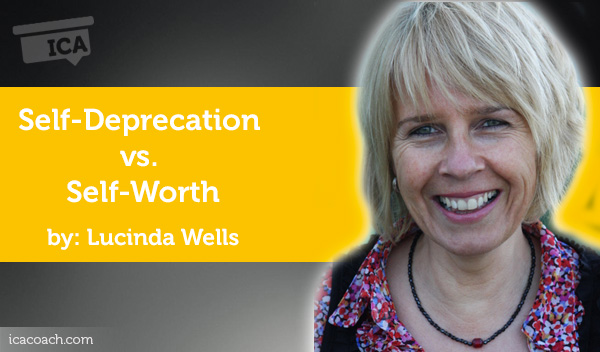
A Coaching Power Tool Created by Lucinda Wells
(Career Coach, UNITED KINGDOM)
Self-Deprecation
Whilst self-deprecation can be charming and amusing (it is often found in stand-up comedy routines) and is perhaps more common in some cultures than others, it can become detrimental if it becomes too dominant and unmanageable.
To deprecate something is to belittle it or downgrade it. That is, to reduce its perceived status, importance, and value.Self-deprecation therefore means belittling yourself, criticising yourself, or running yourself down—both internally in your own mind and externally in the eyes of others. It is defined as:
We all have the potential for some self-doubt and social anxiety, but in people with a deep sense of personal inadequacy, self-deprecation can become a dominant pattern.As the clients’ coach, we are not looking to be the therapist (if in fact this is required) and so we are likely to be working with individuals who are whole and functioning, but who are perhaps overusing this way of operating to the point where it is not serving them well.
In a way, self-deprecation is a way of manipulating others’ perception of oneself in order to avoid taking a blow to one’s self esteem. It’s like a pre-emptive strike that draws attention to one’s failings before anyone else can. There can be numerous root causes for this way of feeling or being and as is often the case, these may emanate from early childhood. Whatever the root cause, the likelihood is that there is a lack of self-worth at play.
Self-Worth
The dictionary definition of self-worth is:
The sense of one’s own value or worth as a person.
There are similarities between self-worth and self-esteem but there are also subtle differences. Self-worth can be seen as more sustainable and longer lasting and coming from within the person. It is based on how much they feel they deserve as a result of what they have earned or contributed to the world. It is closely aligned to the person’s purpose. Therefore self-worth is less reliant on external drivers or validation and more about inner strength than can be carried throughout life. In other words, self-worth is about who you are and not what you do.
Coaching Application
Unless the client has come for coaching already aware that their use of self-deprecation is getting in the way of them achieving their goals, then as their coach, we will need to support them by creating self-awareness through feedback, observation and powerful questioning.
Once the awareness is there and the client has decided that their goal is to develop their self-worth and reduce their reliance on self-deprecation, then there are a number of tools that the coach can use to help them do this. Here are some examples:
Self-Appreciation
Have the client write a list of their top seven qualities those that make them unique. Encourage them to keep these at hand and read them regularly to remind themselves who they are and what makes them special.
Write a List of Past Success
Have the client think about the times in their life when they’ve been successful at something. Have them write a list of these and remind themselves how they achieved these things (what strengths did they leverage) and how great it felt when they’d achieved their goals. Have them use this past experience to fuel their self-belief and confidence for achieving their goals in the future.
Don’t Put Yourself Down
Have the client keep a tally of how many times they have spoken negatively about themselves (either to others or their inner voice). This will help them became aware of how many times a day they are telling people or themselves that they aren’t any good. This can be a real eye-opener for the client, which can help them decrease the frequency of this negative dialogue.
Positive Affirmations
Have the client pick three strong statements, which literally make a negative self-belief into a positive one. For example, if they believe they’re not a confident person then ‘I am a confident person’ should be one of their daily positive affirmations. Encourage them to say their positive affirmations out loud while looking in the mirror.
Conclusion
A certain degree of humility or modesty is not a bad thing. It relies on us having little ego or pride, and being accepting of our own fallibilities and imperfections. We can probably all recall very successful leaders or role models who demonstrate humility and what a positive trait this is.
When this trips over into self-deprecation, the outcome can become less positive and even hold us back, for example in our careers or social relationships. As coaches, we can help our client to recognise if and when this has become a dominant behaviour for them that is no longer serving them well. We can then support them to address this by developing their self-worth so that they can choose a more positive state of being in which they are comfortable in their own skin, where they love themselves, warts and all and appreciate fully their value and worth.